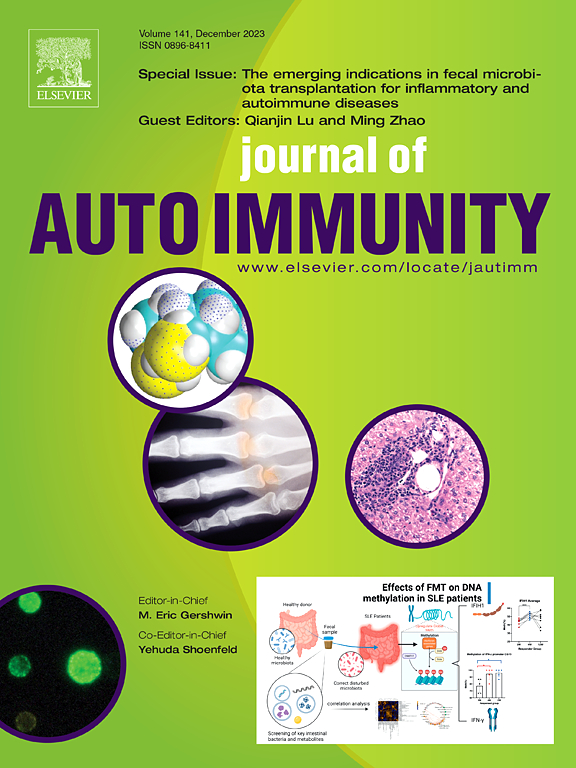Extracellular vesicle autoantibodies
IF 7.9
1区 医学
Q1 IMMUNOLOGY
引用次数: 0
Abstract
Autoantibodies are immunoglobulin proteins produced by autoreactive B cells responding to self-antigens. Extracellular vesicles (EVs) are membranous structures released by almost all types of cells and extensively distributed in various biological fluids. Studies have indicated that EVs loaded with self-antigens not only play important roles in antigen presentation and autoantibody production but can also form functional immune complexes with autoantibodies (termed EV autoantibodies). While numerous papers have summarized the production and function of pathogenic autoantibodies in diseases, especially autoimmune diseases, reviews on EV autoantibodies are rare. In this review, we outline the existing knowledge about EVs, autoantibodies, and EV antigens, highlighting the formation of EV autoantibodies and their functions in autoimmune diseases and cancers. In conclusion, EV autoantibodies may be involved in the occurrence of disease(s) and also serve as potential non-invasive markers that could help in the diagnosis and/or prognosis of disease. Additional studies designed to define in more detail the molecular characteristics of EV autoantibodies and their contribution to disease are recommended.
细胞外囊泡自身抗体
自身抗体是由对自身抗原产生反应的自身反应性 B 细胞产生的免疫球蛋白。细胞外小泡(EVs)是几乎所有类型细胞释放的膜结构,广泛分布于各种生物液体中。研究表明,含有自身抗原的EV不仅在抗原递呈和自身抗体产生中发挥重要作用,还能与自身抗体形成功能性免疫复合物(称为EV自身抗体)。尽管有许多论文总结了致病性自身抗体在疾病(尤其是自身免疫性疾病)中的产生和功能,但有关EV自身抗体的综述却很少见。在这篇综述中,我们概述了有关EV、自身抗体和EV抗原的现有知识,重点介绍了EV自身抗体的形成及其在自身免疫性疾病和癌症中的功能。总之,EV自身抗体可能与疾病的发生有关,同时也是潜在的非侵入性标志物,有助于疾病的诊断和/或预后。我们建议开展更多研究,以更详细地确定EV自身抗体的分子特征及其对疾病的影响。
本文章由计算机程序翻译,如有差异,请以英文原文为准。
求助全文
约1分钟内获得全文
求助全文
来源期刊

Journal of autoimmunity
医学-免疫学
CiteScore
27.90
自引率
1.60%
发文量
117
审稿时长
17 days
期刊介绍:
The Journal of Autoimmunity serves as the primary publication for research on various facets of autoimmunity. These include topics such as the mechanism of self-recognition, regulation of autoimmune responses, experimental autoimmune diseases, diagnostic tests for autoantibodies, as well as the epidemiology, pathophysiology, and treatment of autoimmune diseases. While the journal covers a wide range of subjects, it emphasizes papers exploring the genetic, molecular biology, and cellular aspects of the field.
The Journal of Translational Autoimmunity, on the other hand, is a subsidiary journal of the Journal of Autoimmunity. It focuses specifically on translating scientific discoveries in autoimmunity into clinical applications and practical solutions. By highlighting research that bridges the gap between basic science and clinical practice, the Journal of Translational Autoimmunity aims to advance the understanding and treatment of autoimmune diseases.
 求助内容:
求助内容: 应助结果提醒方式:
应助结果提醒方式:


